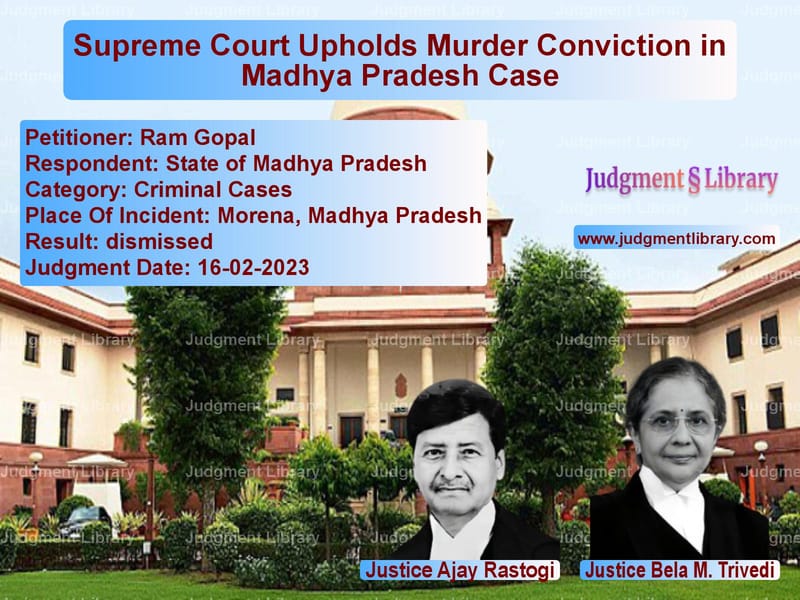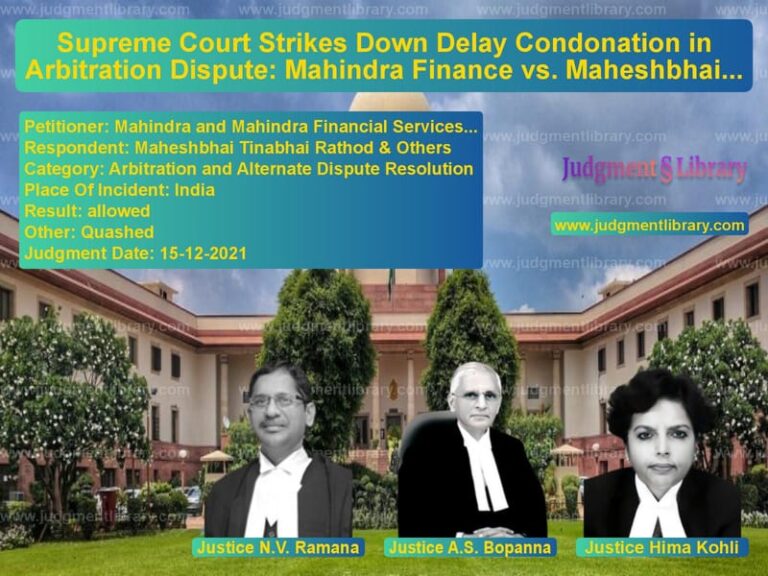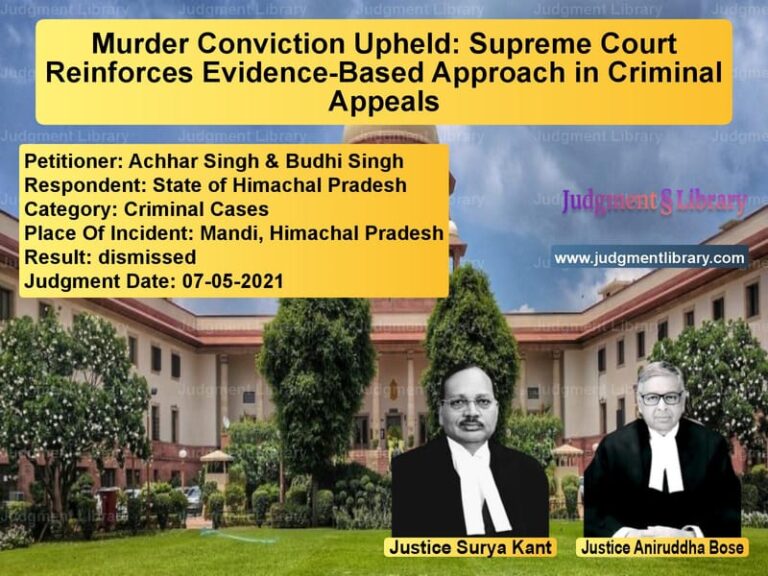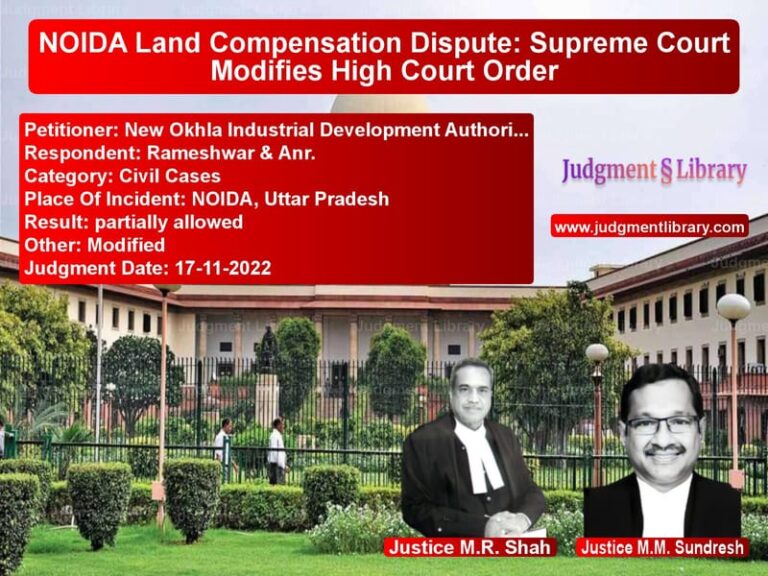Supreme Court Upholds Murder Conviction in Madhya Pradesh Case
The Supreme Court of India recently upheld the conviction of Ram Gopal for the murder of Pratap Singh in the case of Ram Gopal vs. State of Madhya Pradesh. The judgment, delivered by a bench comprising Ajay Rastogi and Bela M. Trivedi, reaffirmed the importance of circumstantial evidence and the ‘last seen together’ doctrine in criminal cases.
Background of the Case
The case stemmed from an incident on December 19, 1995, when Pratap Singh was last seen with the accused, Ram Gopal, in the village of Har Gangoli. The following day, Singh’s body was found with injuries near Bharosibaba’s house in Chachiha village. An FIR was registered against Ram Gopal and three others, leading to a charge under Section 302 of the Indian Penal Code (IPC) for murder.
The First Additional Sessions Judge, Morena, convicted Ram Gopal and sentenced him to life imprisonment along with a fine. The Madhya Pradesh High Court upheld the conviction. Dissatisfied, Ram Gopal approached the Supreme Court, challenging the verdict on the basis of insufficient evidence and the alleged failure of the prosecution to establish an unbroken chain of circumstances.
Arguments by the Petitioner (Ram Gopal)
- The entire case was based on circumstantial evidence, and the prosecution failed to establish a complete chain of events proving the petitioner’s guilt beyond reasonable doubt.
- The ‘last seen together’ theory was weak because there was a significant time gap between when the deceased was last seen with the petitioner and the discovery of the body.
- The recovery of the alleged murder weapon (an axe) could not be directly linked to the crime since the post-mortem report did not confirm that the injuries were caused by the weapon.
- There was no proven motive for the murder as both the petitioner and the deceased had cordial relations.
- While three co-accused were acquitted due to lack of evidence, Ram Gopal was unfairly convicted despite similar circumstances.
Arguments by the Respondent (State of Madhya Pradesh)
- The prosecution had presented a solid case based on circumstantial evidence, which pointed exclusively to the petitioner’s guilt.
- Ram Gopal was last seen with the deceased on the evening of December 19, 1995, and he failed to provide a reasonable explanation for what happened afterward.
- Under Section 106 of the Indian Evidence Act, the burden was on the petitioner to explain when and under what circumstances he parted ways with the deceased. His failure to do so strengthened the case against him.
- The courts had already examined the evidence thoroughly, and there was no legal ground for interference by the Supreme Court.
Supreme Court’s Analysis and Judgment
The Supreme Court examined the following key aspects:
- The ‘Last Seen Together’ Theory: The Court reiterated that when the accused is the last person seen with the deceased, the burden shifts to the accused to explain what happened thereafter. Since Ram Gopal did not offer a valid explanation, this served as an adverse inference against him.
- Role of Section 106 of the Evidence Act: The Court cited previous rulings, including Rajender vs. State (NCT of Delhi) and Satpal vs. State of Haryana, emphasizing that when an accused fails to explain facts within his exclusive knowledge, it adds to the circumstantial evidence against him.
- Proximity of Time Between Last Seen and Discovery of the Body: The Court noted that the time gap between when the victim was last seen with the accused and when his body was discovered was close enough to establish a link.
- Recovery of the Weapon: The Supreme Court acknowledged that the axe recovered from the accused was an additional piece of circumstantial evidence that supported the prosecution’s case.
- Previous Court Findings: The Court held that the Sessions Court and High Court had both carefully assessed the evidence and reached a justifiable conclusion.
Accordingly, the Supreme Court ruled:
“Once the theory of ‘last seen together’ was established by the prosecution, the accused was expected to offer some explanation as to when and under what circumstances he had parted company with the deceased. The burden to prove the guilt of the accused is always on the prosecution, but in view of Section 106 of the Evidence Act, when any fact is within the knowledge of any person, the burden of proving that fact is upon him.”
The Court dismissed the appeal, affirming the life imprisonment sentence of Ram Gopal.
Final Verdict
- The Supreme Court upheld the conviction of Ram Gopal under Section 302 of the IPC.
- The ‘last seen together’ theory and the lack of explanation from the accused played a crucial role in the judgment.
- The Court reaffirmed that circumstantial evidence, if well-connected and unbroken, is sufficient to convict an accused.
This judgment reinforces the importance of the accused’s duty to explain suspicious circumstances when last seen with a deceased person. It also upholds the principle that circumstantial evidence, when strong and unbroken, can be the basis of a conviction.
Petitioner Name: Ram Gopal.Respondent Name: State of Madhya Pradesh.Judgment By: Justice Ajay Rastogi, Justice Bela M. Trivedi.Place Of Incident: Morena, Madhya Pradesh.Judgment Date: 16-02-2023.
Don’t miss out on the full details! Download the complete judgment in PDF format below and gain valuable insights instantly!
Download Judgment: ram-gopal-vs-state-of-madhya-prad-supreme-court-of-india-judgment-dated-16-02-2023.pdf
Directly Download Judgment: Directly download this Judgment
See all petitions in Murder Cases
See all petitions in Judgment by Ajay Rastogi
See all petitions in Judgment by Bela M. Trivedi
See all petitions in dismissed
See all petitions in supreme court of India judgments February 2023
See all petitions in 2023 judgments
See all posts in Criminal Cases Category
See all allowed petitions in Criminal Cases Category
See all Dismissed petitions in Criminal Cases Category
See all partially allowed petitions in Criminal Cases Category







